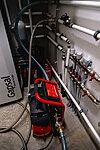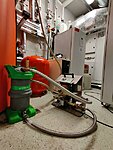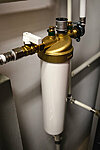Years of practice and simple chemistry in our craft has shown us that a vital part of a heating system - the quality of heating water - is often widely underestimated.
Filling closed loop systems with a plain tap water is a method of last century. Regular tap water has quite high electrical conductivity, which makes it very aggressive and open for oxidation and corrosion, therefore making it not suitable for technical applications in closed water circuits.
Nowadays modern materials, complex components and a compact design with small pipe cross-sections extremely increase the demands on the filling water quality.
Heating systems – no matter whether oil, gas or pellets – can only work effectively if their efficiency is not reduced by corrosion and limescale deposits.
Filling closed loop systems with a plain tap water is a method of last century. Regular tap water has quite high electrical conductivity, which makes it very aggressive and open for oxidation and corrosion, therefore making it not suitable for technical applications in closed water circuits.
Nowadays modern materials, complex components and a compact design with small pipe cross-sections extremely increase the demands on the filling water quality.
Heating systems – no matter whether oil, gas or pellets – can only work effectively if their efficiency is not reduced by corrosion and limescale deposits.
So which kind of water should we use as a long term heating water?
Our data is in line with the German engineers and the answer is - Demineralised water.
Demineralised water is a type of water where the aggressiveness of water is reduced through special mixed bed ion exchange resins. This kind of water treatment allows us to remove mineral and salt ions and replace them with a pure water ions.
It is important because all the minerals and salt ions in water carry a certain amount of electrical charge that contributes to the total conductivity of the water. The bigger the conductivity of a water is, the easier and less oxygen is needed to start a corrosion process (oxidation) in our closed water circuits.
Pure water ions, on the contrary, carry an ultra low levels of electrical conductivity, thus making it harder environment to start a corrosion process in the first place.
As of date, it is the best known method to prevent corrosion in heating systems with closed loop water circuits.
We, in STELO Water Treatment Company, are specialised in our craft and want to help you to save on energy costs and enhance the longevity of your heating system!
Our data is in line with the German engineers and the answer is - Demineralised water.
Demineralised water is a type of water where the aggressiveness of water is reduced through special mixed bed ion exchange resins. This kind of water treatment allows us to remove mineral and salt ions and replace them with a pure water ions.
It is important because all the minerals and salt ions in water carry a certain amount of electrical charge that contributes to the total conductivity of the water. The bigger the conductivity of a water is, the easier and less oxygen is needed to start a corrosion process (oxidation) in our closed water circuits.
Pure water ions, on the contrary, carry an ultra low levels of electrical conductivity, thus making it harder environment to start a corrosion process in the first place.
As of date, it is the best known method to prevent corrosion in heating systems with closed loop water circuits.
We, in STELO Water Treatment Company, are specialised in our craft and want to help you to save on energy costs and enhance the longevity of your heating system!
We have necessary know-how and technology to put it into practice.



